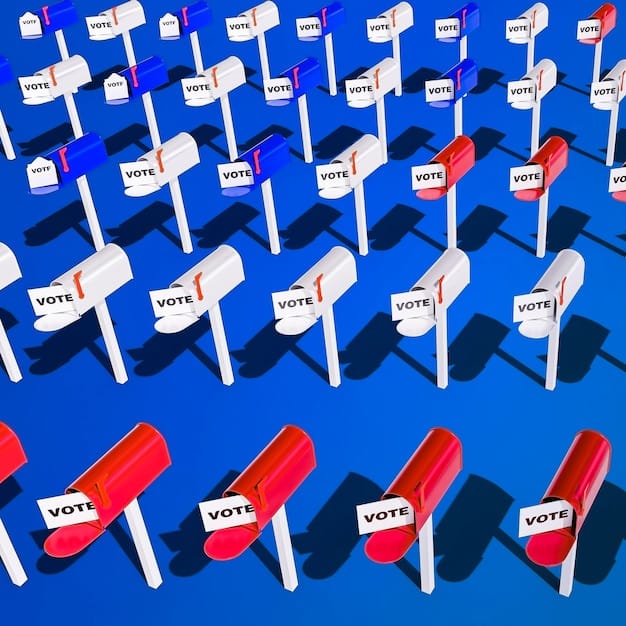US Election Security: Protecting 2026 from Foreign Interference

US Election Security: New Measures to Protect Against Foreign Interference in 2026 focuses on the proactive steps being implemented to safeguard the integrity of upcoming elections from potential cyberattacks and disinformation campaigns, emphasizing enhanced collaboration, updated technologies, and increased public awareness.
The integrity of US elections is constantly under threat. In anticipation of the 2026 elections, significant efforts are underway to bolster US Election Security: New Measures to Protect Against Foreign Interference in 2026. These measures aim to prevent cyberattacks, counter disinformation, and ensure a fair and transparent electoral process.
Enhancing Cybersecurity Infrastructure for Elections
One of the primary focuses for ensuring US election security in 2026 is the enhancement of cybersecurity infrastructure. This involves upgrading voting machines, securing voter databases, and establishing robust incident response plans.
Upgrading Voting Machine Technology
Modernizing voting machines is crucial to prevent vulnerabilities and ensure accurate vote counts. This includes transitioning to machines with verifiable paper trails and implementing regular security audits.
Securing Voter Databases
Protecting voter registration databases from cyberattacks is essential to prevent voter suppression and ensure accurate voter information. Measures include multi-factor authentication, encryption, and continuous monitoring for suspicious activity.

The development and enforcement of cybersecurity standards across all levels of election administration is also integral. These standards should align with industry best practices and be regularly updated to address emerging threats.
- Implement mandatory cybersecurity training for election officials and staff.
- Conduct regular penetration testing to identify and address vulnerabilities.
- Establish a centralized incident response team to handle cybersecurity incidents.
These cybersecurity measures aim to fortify the digital foundations of the US election system, making it more resilient against foreign interference and ensuring the democratic process remains secure.
Combating Disinformation Campaigns
Disinformation campaigns pose a significant threat to election integrity. Efforts to combat these campaigns include monitoring social media, collaborating with tech companies, and promoting media literacy among the public.
Monitoring Social Media Activity
Tracking the spread of false information on social media platforms allows for rapid response and correction. This involves using advanced analytics tools to identify and flag disinformation campaigns.
Collaborating with Tech Companies
Working with social media companies to remove disinformation and promote accurate information is crucial. This includes establishing clear reporting channels and implementing policies to combat the spread of false narratives.

Public awareness campaigns also play a role in equipping citizens with the tools to discern credible information and critically evaluate online content.
- Launch public service announcements highlighting the dangers of disinformation.
- Partner with educational institutions to incorporate media literacy into curricula.
- Support community-based initiatives to promote critical thinking and informed decision-making.
These efforts combine technology, partnerships, and education to create a multi-faceted approach to combating disinformation and safeguarding the integrity of the electoral process.
Strengthening International Cooperation
Foreign interference in elections is a global issue, necessitating strengthened international cooperation. This involves sharing intelligence, coordinating cybersecurity efforts, and establishing common standards for election security.
Collaborating with international partners allows for the sharing of best practices and lessons learned in combating foreign interference. This includes joint training exercises and the exchange of expertise.
Establishing norms and standards for online behavior can help deter malicious actors and promote responsible conduct in cyberspace. This involves working with international organizations to develop and enforce these standards.
International cooperation is essential for addressing the global threat of foreign interference in elections. By working together, nations can enhance their collective ability to protect their democratic processes.
Sharing information about potential threats from foreign actors and coordinating responses is key. Alliances built on mutual trust create stronger defenses.
- Participate in international forums on election security.
- Share intelligence on foreign interference activities.
- Support international efforts to promote democratic governance.
By engaging in international collaboration, the US can strengthen its defenses against foreign interference and contribute to the protection of democratic processes worldwide.
Enhancing Legal and Regulatory Frameworks
The strength of legal and regulatory frameworks are foundational to US election security. These frameworks provide the legal basis for combating foreign interference and ensuring accountability.
Updating existing laws to address new forms of foreign interference is essential. This includes expanding legal definitions and increasing penalties for malicious actors.
Granting more explicit authority to law enforcement agencies allows for the investigation and prosecution of foreign interference activities. This includes subpoena power and increased resources.
These legal and regulatory measures provide the necessary tools to deter and punish those who seek to undermine the integrity of US elections.
Establishing clear legal standards for election security can streamline investigations and prosecutions, while also clarifying expectations.
- Modernize election laws to address cyber threats.
- Enhance the powers of law enforcement agencies to investigate foreign interference.
- Strengthen penalties for those who attempt to undermine elections.
By fortifying legal and regulatory frameworks, the US can send a clear message that election interference will not be tolerated and will be met with swift and decisive action.
Boosting Voter Confidence and Participation
Maintaining voter confidence and participation is crucial for a healthy democracy. Efforts to boost voter confidence include ensuring transparent election processes, providing accurate information, and addressing voter concerns.
Ensuring that election processes are transparent and accessible builds trust among voters. This includes allowing for observation of vote counting and providing clear explanations of election procedures.
Providing accurate information about candidates, issues, and voting processes enables voters to make informed decisions. This includes voter education campaigns and accessible online resources.
Transparent processes are key to maintaining public trust. If citizens understand how their vote is counted, they are less likely to believe in conspiracies.
- Implement transparent vote counting procedures.
- Provide voter education materials in multiple languages.
- Address voter concerns and questions promptly and accurately.
By fostering transparency, providing information, and addressing concerns, the US can bolster voter confidence and encourage greater participation in the democratic process.
Leveraging Artificial Intelligence and Machine Learning
Artificial intelligence (AI) and machine learning (ML) offer new tools for enhancing election security. These technologies can be used to detect disinformation, identify cyber threats, and improve voter turnout.
AI algorithms can analyze social media data to identify and flag disinformation campaigns in real-time. This allows for rapid response and correction of false narratives.
ML models can analyze network traffic to detect and prevent cyberattacks on election systems. This includes identifying unusual patterns and blocking malicious activity.
These advanced technologies provide new capabilities for protecting elections from a range of threats. However, responsible use is crucial to mitigate any potential biases.
- Develop AI tools to detect disinformation campaigns.
- Use ML models to identify and prevent cyberattacks.
- Leverage AI to improve voter turnout through targeted outreach.
By harnessing the power of AI and ML, the US can enhance its election security capabilities and stay one step ahead of those who seek to undermine the democratic process.
| Key Area | Brief Description |
|---|---|
| 🔒 Enhanced Cybersecurity | Upgrading voting machines and securing voter databases to prevent cyberattacks. |
| 📢 Combating Disinformation | Monitoring social media and collaborating with tech companies to counter false narratives. |
| 🤝 International Cooperation | Sharing intelligence and coordinating efforts with international partners to address global threats. |
| 🤖 AI and Machine Learning | Leveraging AI to detect disinformation and ML to prevent cyberattacks on election systems. |
Frequently Asked Questions
▼
Foreign interference includes any activity by a foreign government or actor designed to influence US elections, such as cyberattacks, disinformation campaigns, or illegal campaign contributions.
▼
Voting machines are being secured through upgrades to verifiable paper trails, regular security audits, and implementation of robust cybersecurity protocols to prevent tampering and ensure accurate vote counts.
▼
Efforts to combat disinformation campaigns include monitoring social media activity, collaborating with tech companies to remove false information, and promoting media literacy among the public to help voters discern credible sources.
▼
International cooperation is vital because foreign interference is a global issue. Sharing intelligence, coordinating cybersecurity efforts, and establishing common standards helps deter malicious actors and protect democratic processes.
▼
AI and machine learning can enhance election security by detecting disinformation campaigns in real-time, identifying cyber threats on election systems, and improving voter turnout through targeted outreach efforts.
Conclusion
Securing US elections in 2026 and beyond requires a multifaceted approach that includes enhancing cybersecurity infrastructure, combating disinformation campaigns, strengthening international cooperation, updating legal frameworks, boosting voter confidence, and leveraging advanced technologies like AI and machine learning. By implementing these measures, the US can protect its democratic processes and ensure fair and transparent elections.





